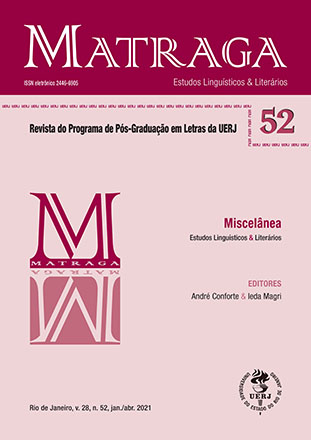A ficção e o documento: uma leitura de Mulheres Empilhadas de Patrícia Melo e de Garotas Mortas de Selva Almada
DOI:
https://doi.org/10.12957/matraga.2021.53201Palavras-chave:
Documento, Ficção, Patrícia Melo, Selva Almada, Literatura Contemporânea.Resumo
O ensaio tem como principal objetivo refletir sobre a relação entre a literatura e o documento. Se por um lado podemos identificar um interesse teórico por essa relação e um incremento de uma nomenclatura que tenta capturar esse impulso, como a ideia de narrações documentais (RUFFEL, 2012), factografias (ZENETTI, 2011) ou ainda o que Paula Klein (2019) chama de uma poética de arquivos, também é possível identificar que nos últimos anos muitas obras incorporam fotos, materiais de arquivo e anotações do processo de escrita para construir narrativas que põem em xeque seu estatuto ficcional, embora nem sempre essas obras repudiem a chancela do gênero romance. Nesse sentido, me interessa resgatar o argumento principal desenvolvido por Flora Sussekind em Tal Brasil, qual romance (1984) para pensar o que poderia ser considerada uma outra guinada documental da literatura contemporânea. Sussekind afirma que a insistência cíclica da literatura brasileira em uma estética naturalista (mais que realista) faz com que as obras neguem sua própria construção enquanto linguagem, pois tomam como paradigma a objetividade e a veracidade que o documento pode garantir à ficção. Se é verdade que desde o início do século XXI podemos falar de uma “fome de real” (SHIELDS, 2010), este artigo quer investigar como a utilização de dados factuais (como reprodução de processos jurídicos e reportagens) pode ter muitas nuances. Por um lado, pode servir, sim, para revigorar uma tradição realista que valoriza o mimetismo da ficção em relação ao real, utilizando o documento como prova, mas também é possível arriscar que a tensão criada pela apropriação de fontes documentais por muitas narrativas contemporâneas pode indiciar uma tentativa de redefinir o valor e novas fronteiras para o que entendemos como ficção. Para discutir melhor esse pressuposto, tomaremos para análise Mulheres Empilhadas (2019) de Patrícia Melo e Garotas Mortas (2014) de Selva Almada.
Downloads
Downloads
Publicado
Como Citar
Edição
Seção
Licença
AUTORIZAÇÃO
A Matraga – Revista do Programa de Pós-Graduação em Letras da UERJ está autorizada a publicar o artigo ora submetido, caso seja aceito para publicação online. Fica atestado que a contribuição é original, que não está sendo submetida a outro editor para publicação, e que a presente declaração é a expressão da verdade.
Os trabalhos publicados no espaço virtual da Matraga – Revista do Programa de Pós-Graduação em Letras da UERJ serão automaticamente cedidos, ficando os seus direitos autorais reservados à Matraga. Sua reprodução, total ou parcial, é condicionada à citação dos autores e dos dados da publicação.

A Matraga utiliza uma Licença Creative Commons - Atribuição-NãoComercial 4.0 Internacional.





